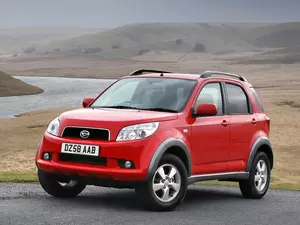
| Vehicle | Curb weight | Difference from world's smallest | Weight to power ratio | 0—60 mph acceleration ratio | Consumption ratio |
|---|---|---|---|---|---|
| 1.5 |
1255 kg / 2767 lbs |
830 kg (1830 lbs) heavier | 12 kg to 1 hp | - | - |
| Vehicle | 1.5 |
|---|---|
| Curb weight |
1255 kg / 2767 lbs |
| Difference from world's smallest | 830 kg (830 lbs) heavier |
| Weight to power ratio | 12 kg to 1 hp |
| 0—60 mph acceleration ratio | - |
| Consumption ratio | - |

| Vehicle | Curb weight | Difference from world's smallest | Weight to power ratio | 0—60 mph acceleration ratio | Consumption ratio |
|---|---|---|---|---|---|
| 1.5 i 16V 4WD |
1200 kg / 2646 lbs |
775 kg (1709 lbs) heavier | 11 kg to 1 hp | 90 kg/s (198 lbs/s) | - |
| Vehicle | 1.5 i 16V 4WD |
|---|---|
| Curb weight |
1200 kg / 2646 lbs |
| Difference from world's smallest | 775 kg (775 lbs) heavier |
| Weight to power ratio | 11 kg to 1 hp |
| 0—60 mph acceleration ratio | 90 kg/s (198 lbs/s) |
| Consumption ratio | - |

| Vehicle | Curb weight | Difference from world's smallest | Weight to power ratio | 0—60 mph acceleration ratio | Consumption ratio |
|---|---|---|---|---|---|
| 0.7 i 12V CL |
960 kg / 2117 lbs |
535 kg (1180 lbs) heavier | 16 kg to 1 hp | - | - |
| 0.7 i 12V |
1000 kg / 2205 lbs |
575 kg (1268 lbs) heavier | 16 kg to 1 hp | - | - |
| Vehicle | 0.7 i 12V CL |
|---|---|
| Curb weight |
960 kg / 2117 lbs |
| Difference from world's smallest | 535 kg (535 lbs) heavier |
| Weight to power ratio | 16 kg to 1 hp |
| 0—60 mph acceleration ratio | - |
| Consumption ratio | - |
| Vehicle | 0.7 i 12V |
| Curb weight |
1000 kg / 2205 lbs |
| Difference from world's smallest | 575 kg (575 lbs) heavier |
| Weight to power ratio | 16 kg to 1 hp |
| 0—60 mph acceleration ratio | - |
| Consumption ratio | - |

| Vehicle | Curb weight | Difference from world's smallest | Weight to power ratio | 0—60 mph acceleration ratio | Consumption ratio |
|---|---|---|---|---|---|
| 1.3 i 16V 4WD Turbo |
1045 kg / 2304 lbs |
620 kg (1367 lbs) heavier | 7 kg to 1 hp | 58 kg/s (128 lbs/s) |
124 kg/L (273 lbs/L) |
| 1.3 i 16V 4WD |
1125 kg / 2481 lbs |
700 kg (1544 lbs) heavier | 13 kg to 1 hp | 74 kg/s (163 lbs/s) |
146 kg/L (322 lbs/L) |
| Vehicle | 1.3 i 16V 4WD Turbo |
|---|---|
| Curb weight |
1045 kg / 2304 lbs |
| Difference from world's smallest | 620 kg (620 lbs) heavier |
| Weight to power ratio | 7 kg to 1 hp |
| 0—60 mph acceleration ratio | 58 kg/s (128 lbs/s) |
| Consumption ratio |
124 kg/L (273 lbs/L) |
| Vehicle | 1.3 i 16V 4WD |
| Curb weight |
1125 kg / 2481 lbs |
| Difference from world's smallest | 700 kg (700 lbs) heavier |
| Weight to power ratio | 13 kg to 1 hp |
| 0—60 mph acceleration ratio | 74 kg/s (163 lbs/s) |
| Consumption ratio |
146 kg/L (322 lbs/L) |